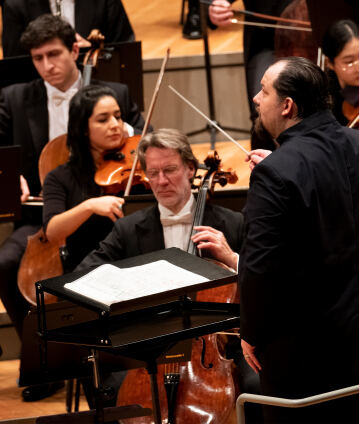Andris Nelsons conducts Stravinsky’s “Le Sacre du printemps”

In its day, Stravinsky’s Le Sacre du printemps shook the musical world. The work sounded outrageously new, and its power and highly rhythmic tonal language still speak to us directly today. Here it is conducted by Andris Nelsons, who opens the concert with Jüri Reinvere’s homage to Mozart’s sister Maria Anna. Weinberg’s Trumpet Concerto is a discovery: dazzlingly virtuosic and full of irony. The soloist is Håkan Hardenberger.
In this programme, the Berliner Philharmoniker, conducted by Andris Nelsons, present works by Eastern European composers that were premiered between 1913 and 2021. The programme opens with the nocturne Maria Anna, wach, im Nebenzimmer by Jüri Reinvere, who has established himself in recent years as one of the most unconventional of composers. The title alludes to Mozart’s sister – and at the same time to people who work in the immediate environment of creative processes. Reinvere describes the composition as having “the atmosphere of a waking dream torn apart several times between consciousness and unconsciousness emerges, a nocturne of floating”.
The internationally renowned trumpeter Håkan Hardenberger is one of the foremost performers of the work of composer Mieczysław Weinberg today. Weinberg’s 1968 Trumpet Concerto begins with a short chromatic motif from the solo instrument that recurs several times. In its dance-like passages, it seems to evoke the world of the circus and, with a quotation from Mendelssohn’s Wedding March, to refer to a programme – albeit one that has not survived.
The Paris premiere of Stravinsky’s Sacre du printemps in 1913 turned into one of the most famous scandals in the history of music. “People laughed, jeered, whistled, imitated animal voices,” wrote author and director Jean Cocteau, at the time one of the most astute observers of all contemporary arts. The irregular rhythms and stark dissonances seemed to evoke scenes of pre-civilisation times. Cocteau grasped the ambivalence between radical modernity and the ancient: he heard in the music both “the noise of war” and “prehistoric pastoral songs”. Renamed “Massacre du printemps” by a contemporary witness, the excitement surrounding the piece resembled a violent storm, which, however, also passed quickly. Soon, hardly anyone doubted that the history of modern music should be divided into a time before and after Sacre.
© 2021 Berlin Phil Media GmbH
Related interviews
Artists
Our recommendations
- Andris Nelsons conducts Mahler’s Fifth Symphony
- Andris Nelsons conducts Strauss’s “Alpine Symphony”
- Andris Nelsons conducts Wagner and Bruckner
- Andris Nelsons conducts Mozart, Wagner and Shostakovich
- Andris Nelsons and Baiba Skride make their debuts with the Berliner Philharmoniker
- Andris Nelsons and Mitsuko Uchida